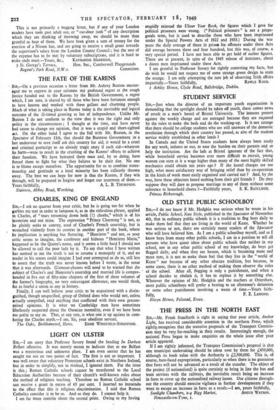CHARLES, KING OF ENGLAND
SIR,—I ask no quarter from your critic, but he is going too far when he garbles my text in order to lampoon it, as in the ridiculous phrase, applied to Charles, of " tears streaming down both (!) cheeks," which is of his invention and not mine. The expression "Prince Charming " is not, as he plainly seeks to convey, used of Charles's French courtship, but is wrenched violently from its context in another part of the book, where its implication is anything but flattering. " Henriette " and not, as your critic seems to imagine, the cumbrous and hideous "Henrietta Maria," happened to be the Queen's name, and it seems a little hard I should not be allowed to call the poor lady by it. To say that what I have written has seemed to me the truth is not to assume a monopoly of it, and no reader in his senses could imagine I had ever attempted to do so, still less to assert that the truth was never known before I wrote, in the sense that it was afterwards. Glamour-chasers will need to be warned that the subject of Charles's and Henriette's courtship and married life is compre- hended in five out of fifty-nine chapters of the first of three volumes of the former's biography, no very extravagant allowance, one would think, for as fateful a union as any in history.
Finally, I can well believe your critic to be acquainted with a distin- guished, though unspecified, group of Oxford dons who would not, unless actually compelled, read anything that conflicted with their own precon- ceived opinions. It is what we Cambridge men have sometimes libellously suspected about the Oxonian mentality, even if we have been too polite to say so. That, at any rate, is what one is up against in com- bating the Charles myth.—I am, Sir, your obedient servant,






































 Previous page
Previous page